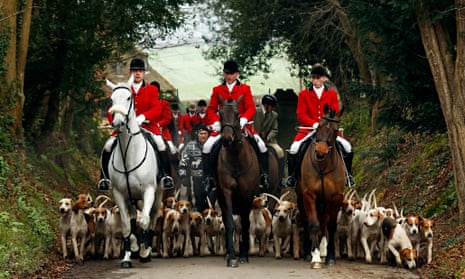Are you on the turkey curry yet? Or still ploughing through the cold meat sarnies? Over the past week we have gobbled 10m turkeys in the UK. Apparently 87% of us think it wouldn’t be Christmas without one.
Old habits die harder than one might have anticipated. On Boxing Day 250,000 people (by the Countryside Alliance’s reckoning) turned out to support 300 hunts across the country. Sure, there’s that ban and all. But you can, of course, still legally kill a fox with two hounds. And should it prove tricky dissuading the whole pack from getting stuck in at that crucial moment, the legislation does allow for accidents. Handy, eh? Worth bearing that in mind the next time you’re caught accidentally nicking a car or punching someone in the face.
Some people do still speak out. Things got a bit grisly at a confrontation in Lewes town centre. Tracey Crouch, the sports minister, showed she was more commonsense Chatham (her constituency) than kowtowing Tory when she called, on Boxing Day, for foxhunting to be “consigned to history”.
But such protests are a faint echo of the days of mass rallies and mainstream outrage. Now we mostly just sit back and let the hunters get on with it – outside and in. The final season of Downton Abbey began with a hunt, to scant backlash. And though the centrality of bloodsports to life at Highclere has been downplayed, that’s likely to be as much for reasons of tedium as taste.
Yet 25 years ago the idea that we’d still be committed nowadays to cooking 50,000 tonnes of turkey on Christmas Day and then the next morning applauding as people trotted off for organised slaughter would have been bizarre. Many confidently foresaw a post-hunting, post-battery farming future in which more people avoided meat than not. As society became more secular, ran the logic, so we would embrace animals within a new spirituality, no longer assuming that man had dominion. In 1991 Plymouth council drafted a charter banning not just hunting but shooting, fishing with barbed hooks on their land, boiling lobsters, whipping horses and giving goldfish as prizes at fetes.
It’s easy to forget how radical things were and how certain an animal rights revolution seemed. But it never happened. Those children who – like me – went vegetarian and wept as Neighbours’ duck hunt saboteur Kerry Bishop martyred herself, lapsed at some point into meek meat-eating, hiding behind the hope that paying reassuringly high prices would wash the blood off our hands.
Why? The clue perhaps lies in the main reason now cited to encourage us to go veggie: lowering your carbon footprint. Self-interest now ranks more highly than any ethical concern – there needs to be something in it for you as well as the beastie. Likewise the red herring of primate rights: in America the cases being argued at the moment start not from the idea that animals in general ought to have rights but that these particular ones should, because they’re so very like us.
The soothsayers were correct that western religion would diminish. But rather than this exciting a greater spiritual awareness, it simply heightened our individualism.
There are positives. Our selfie-gaze does extend to our fellow man. We are now thankfully generally more accommodating of human difference, be it sexual, racial or religious. But this determined tolerance can have an impact on others. There are consequences to feeling uneasy about telling people how they ought or ought not to exercise their rights, about calling their habits unpalatable.
So our anger has abated, our fire has fizzled out. We have no appetite for the fight. But hunts are still battlefields, if you’re the fox or the hound. Abattoirs likewise – albeit with the odds very much in one party’s favour. Tradition remains secure: it was our apathy wot won it.

